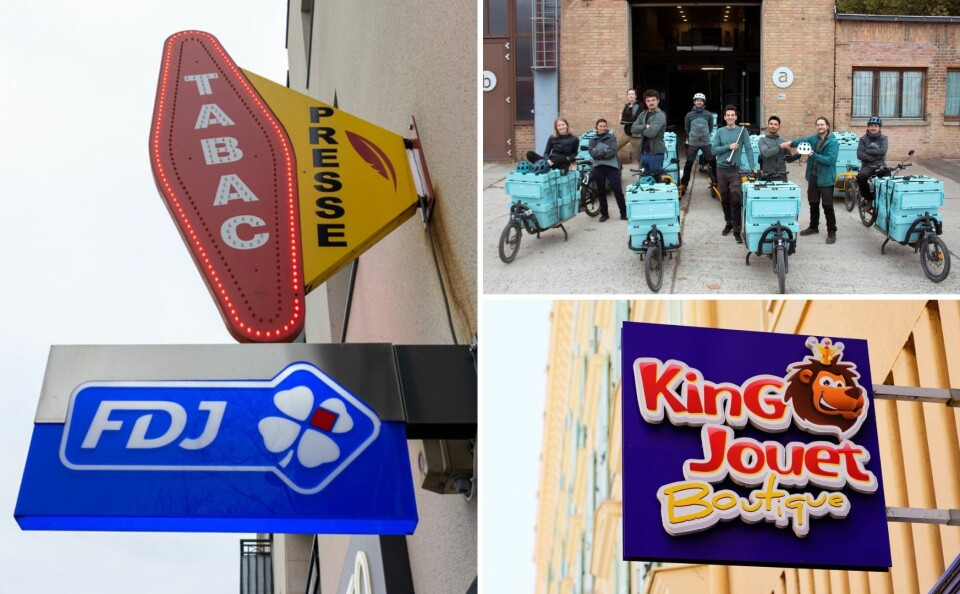-
Drinking tap water restricted for children in south-west France communes
Haute Garonne prefecture says the measure is precautionary and due to high chlorate levels
-
France targets imports from South America over banned chemical concerns
Avocados, mangoes, and cherries among food items set to be tested before entry
-
Environment and ecology: What's new in France in 2026
Changes include a ban on microplastics, the future of ZFE low-emission zones for drivers and new offshore wind farms
Compost, scratchcard ‘scam’, toy eco-rating: green news in France
The government has been accused of greenwashing gambling with its biodiversity lottery and a Strasbourg charity is collecting food waste by bike

Strasbourg food waste collection
Employees of Sikle, an eco-minded association based in Strasbourg (Bas-Rhin), travel around the city on specially customised ‘cargo bikes’ to collect food waste from companies and private individuals before transforming it into compost.
The service, which is used by restaurants, hotels, bars and cafés, bakeries, florists, supermarkets and shopping centres, costs €60 per month for one visit per week. Sorting crates for various types of waste are provided.
“The idea came from the observation that a lot of food waste had not yet been recycled.
“In other words, when we put it in a black bin bag, it goes to incineration, which makes no sense because food waste is 80% water.
“We can transform this waste into a resource,” Joakim Dangel, who founded the project, told www.francetvinfo.fr
Meanwhile, twice a week, the association also sets up collection points for 400 households around the town centre.
Once mixed with wood shavings, the food waste is transformed into compost, and in a few weeks becomes a natural fertiliser to be sold by the bag (2.5 or 40litre) or loose ‘en vrac’.
Read more: Seven questions about new obligatory composting law in France
Loto game is ‘biodiversity scam’
The French government has only just launched its ‘Mission Nature’ biodiversity charity lottery, yet the scratch card game has already encountered controversy, with one environmental association calling it a ‘biodiversity scam’.
The game cards, which are available at Française des Jeux retail outlets (such as tabacs, are intended to raise at least €6million for the French Biodiversity Office (OFB), in order to finance around twenty ecological projects – including the protection of peat bogs in the Hauts-de-Somme region and the protection of posidonia [underwater forests that serve as fish nurseries] in the Mediterranean.
Of the €3 ticket price, only 43 centimes goes to biodiversity projects (66% goes to winning players; 7.1% is tax, 6.6% goes to FDJ and 6% to retailers) – a total which is unacceptably low, says France Nature Environnement, a national federation of associations for the protection of nature and the environment in France.
Its President, Antoine Gatet, also believes the €6million target is too low.
“We need €500 to €600million a year to finance biodiversity,” he said, adding that “we’d prefer the government to take the time to find these sums by taxing kerosene in France, for example.”
There are also concerns about the cards increasing risk of gaming addiction among young people.
“It’s a public health issue,” said Liberal Party MP Christine Lavarde, pointing to the “dangers of gambling and the addiction it can create”, while Socialist MP Angèle Préville, has denounced the lottery game as “greenwashing of gambling”.
Read more: New scratchcard lotto to launch in France to help biodiversity
Toys get a green rating
Family toy firm King Jouet, which is headquartered in Voiron (Isère), has launched a ‘toy score’ to rate the environmental value of products on sale in its stores.
The 1,600 items in its 2023 Christmas catalogue are the first to receive a score from 0 to 5, which is marked next to the product price.
Based on the concept of rating food products, the ‘Jouet Score’ (toy score) scheme aims to promote environmentally-friendly products, with marks awarded based upon manufacturing processes, packaging and materials used.
Read more: Save money in France by finding missing board game pieces
They worked with Ecomaison, the organisation mandated by the French government to look after the toy recycling sector, to establish the ratings.
“We give priority to FSC wood (from sustainably managed forests) and products made from recycled materials,” said project leader Coralie Gueydon, who told France Bleu that the aim is “to pull the industry upwards and raise suppliers’ awareness.
“As distributors, we have a responsibility to be transparent and to support consumers in their purchasing decisions.”
It is already having an impact, she says: “since the launch of the ‘toy score’, some of our suppliers have come to us asking how they can get a better score. So we’re delighted with this approach, because we think it’s starting to take root.”
Related articles
Most homes in France not ready to separate food waste come January 1
Three little-known French websites to sell unwanted old clothes
Will €3.5billion pledge be enough to secure future of French farming?
























